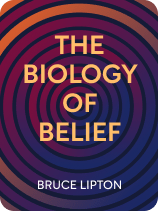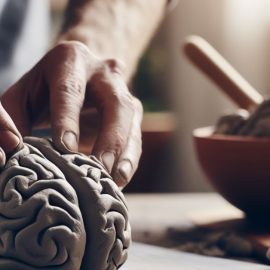

This article is an excerpt from the Shortform book guide to "The Biology of Belief" by Bruce Lipton. Shortform has the world's best summaries and analyses of books you should be reading.
Like this article? Sign up for a free trial here.
What are Dr. Bruce Lipton’s views on epigenetics? What has his research found about the behavior of cells?
According to The Biology of Belief by Dr. Bruce Lipton, epigenetics can show us how our environment and thoughts influence our cells. He further claims that cell behavior is a mirror to human behavior.
Keep reading to learn more about Lipton’s research on epigenetics.
Cell Behavior Is a Microcosm of Human Behavior
Dr. Bruce Lipton’s epigenetics research on cells since the 1970s has shifted the way he thinks, not only about biology but about life. His research has taught him that cells have intelligence and live in cooperative communities, working together in response to the signals they get from their environment. He sees cells as a microcosm of the human world, from which we can learn a great deal about ourselves, our relationships, and our societies.
(Shortform note: In her book Secrets of Your Cells, biologist Sondra Barrett argues, like Lipton, that every cell in your body is an intelligent being. She says our bodies are composed of “trillions of sentient entities cooperating to create a sanctuary for the human soul” and that we can take wisdom from our cells about how to best live our lives.)
The Brain in the Membrane
Perhaps the most revolutionary theory Lipton proposes about cells is that the cell’s “brain” lies not in its nucleus but in its membrane, the outer layer that envelops it. This is an important concept underlying all of his work because it explains why the cell’s environment is the force driving its behavior.
Traditional cell biology says that DNA provides the “program” that directs a cell’s behavior, and all of your cells act according to this program to determine almost everything about you. Each of your cells contains a copy of your DNA, which resides in the nucleus of the cell. So cell biologists assumed that the nucleus of a cell must be its central controlling mechanism, akin to its brain.
However, Lipton observed that when you remove a cell’s nucleus, it doesn’t immediately die—it continues to function. The only thing the cell can’t do without its nucleus is reproduce. He concluded that the nucleus of the cell is more akin to the body’s reproductive organs. If it were akin to the brain, the cell would be unable to live without it.
Lipton noted that the cells of the simplest organisms, like bacteria, don’t even have a nucleus, and yet they live and behave much like more complex cells (they just reproduce differently). But the one feature characteristic of the cells of all living things is that they have a membrane. This insight led him to observe that the cell’s membrane interprets and responds to signals from its environment, in much the same way our brains interpret what’s going on around us and decide how to respond. Lipton concluded that the membrane of the cell is actually directing its behavior, based on environmental information. The environment of your cells is your body chemistry. Your cells react to the chemical and energetic signals in your body, many of which are created by your thoughts, beliefs, and emotions. And this can actually affect the expression of the genetic material inside the cell’s nucleus.
| The Brain-Membrane Comparison Is Controversial Lipton’s claim that the cell’s “brain” is its membrane has been met with some criticism. One critique is that Lipton sets up a straw man argument by asserting that scientists believe the nucleus is the brain of the cell, and then he sets out to debunk that idea. However, critics say scientists have never claimed that the cell’s “brain” is the nucleus and have long recognized the complex interaction of the parts of the cell in directing cell behavior. It can also be argued that the comparison between the cell membrane and the brain is a stretch. One important difference is that the brain has the ability to learn and adapt to new information through a process called plasticity. Plasticity allows the brain to change by altering connections in its networks. Without plasticity, we wouldn’t be able to learn or adapt to our environment. By contrast, the cell membrane’s responses are more fixed and determined by its physical properties. |
Your Thoughts Contribute to Your Cells’ Environment
The idea that thoughts can have a direct effect on the material world has been largely rejected in the scientific worldview since the 1600s, when French philosopher Descartes proposed that the mind and body are distinct realms. The suggestion that your beliefs can affect your body has typically been dismissed as magical thinking, and Lipton recounts facing such reactions himself. But he says science now solidly confirms the inseparability of mind and body.
Lipton explains that the mind-body dynamic works like this:
- Your mind perceives what’s happening around you.
- Your brain cells interpret that information and respond by secreting chemicals.
- Those chemicals circulate through your bloodstream to your whole body, becoming the environment in which all of your cells operate.
- How your cells operate in response to those chemical signals influences how you’ll behave and determines your overall health and well-being.
Lipton explains that the neurochemicals created in your brain are constantly affecting your cellular community. One of the ways this can negatively impact you is through the toxic chemical environment created by chronic stress.
| Mind Over Matter Studies have shown that thoughts alone can improve cognition, vision, fitness, and strength. For example, in one study, researchers asked two groups of people to answer questions on a computer. One group was told that the answers would be briefly flashed on their screens before each question, while the other group was told that the flashes simply signaled the next question. In reality, both groups were shown a random string of letters instead of the answers. However, the group that believed they were being shown the answers performed better on the test. Other research shows that our thoughts can even improve our vision and physical strength. For instance, when people were put into the mindset of an Air Force pilot by being placed in a flight simulator, their vision improved. These kinds of studies show that our thoughts and expectations can have a significant impact on our abilities and suggest that by using our thoughts more intentionally we may be able to improve our performance in various areas. |

———End of Preview———
Like what you just read? Read the rest of the world's best book summary and analysis of Bruce Lipton's "The Biology of Belief" at Shortform.
Here's what you'll find in our full The Biology of Belief summary:
- That your mindset matters more than your genetics when it comes to health
- How your thoughts affect your immune system and hormones
- Why humans should join together in a community to aid survival






